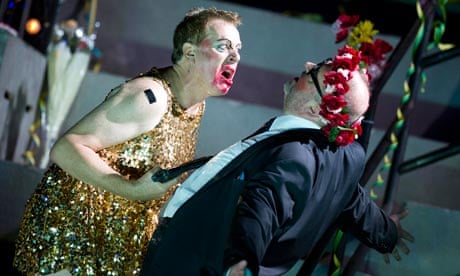Premiered in Frankfurt in 2006, Caligula is the first of Detlev Glanert's full-scale operas to be taken into the UK repertory, and ENO should be commended for tackling it. A brave, if flawed piece, it's based on Albert Camus's play, first performed in 1945, which charts Caligula's descent into violence after the death of his sister and lover Drusilla. His tyranny is viewed in existentialist terms, not as a product of mental aberration but as an extreme abuse of the freedom conferred by absolute power.
Aristocratic decadence is not a new subject in opera, and the score has a knowing quality, as if Glanert is engaged in a series of dialogues with operatic tradition. The pervasive sense of erotic menace owes much to Strauss's Elektra and Schreker's Die Gezeichneten. Caligula (Peter Coleman-Wright) and his fatally masochistic wife Caesonia (Yvonne Howard) are baritone and dramatic high mezzo, not unlike Verdi's Macbeths. Their foul countertenor sidekick Helicon (Christopher Ainslie) is reminiscent of Nero in Monteverdi's Coronation of Poppea, and among the conspirators ranged against Caligula, we find his friend Scipio, a mezzo (Carolyn Dobbin) in drag, like the not dissimilar Sesto in Mozart's La Clemenza di Tito.
The principal flaw is one of shape: the violence – which includes the rape of a senator's wife and a particularly vile murder – is genuinely and rightly appalling but peaks in intensity well before the interval, which is far too soon. The score loses its grip for too much of the second half, though Glanert provides more than adequate compensation at the work's chilling emotional climax: Caligula's sexualised murder of his wife, in which she willingly participates as the supreme expression of her devotion to him.
There are flaws in Benedict Andrews's production, too. Mindful of the political appropriation and abuse of sport and its venues by 20th-century dictators, he relocates the opera to a modern stadium, where Caligula's terrorised subjects cheer him on and wave flags like automata. Some of it is genuinely unsettling, but the set also cramps the action to the front of the stage, while the ghostly presence of the dead Drusilla as an on-stage spectator sits uneasily with the underlying idea of a godless universe in which there can be no afterlife. The cast is consistently superb: Coleman-Wright is outstanding in the gruelling title role, while the way Ainslie conveys a sense of servile evil beneath immense surface charm is unforgettable. There's fine conducting from Ryan Wigglesworth, too.

Comments (…)
Sign in or create your Guardian account to join the discussion